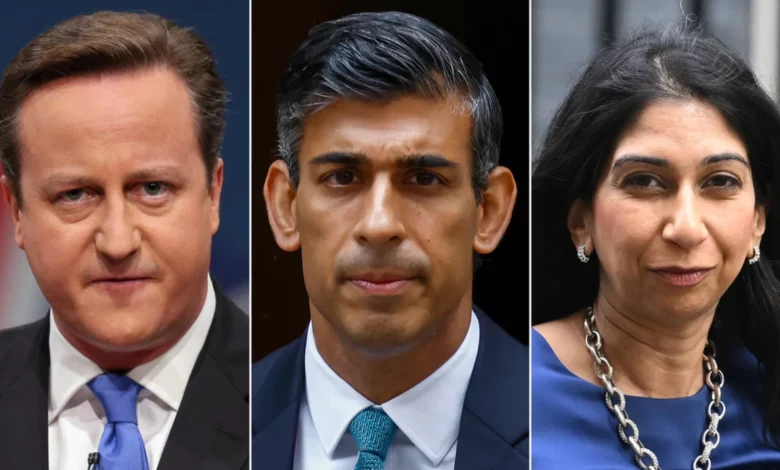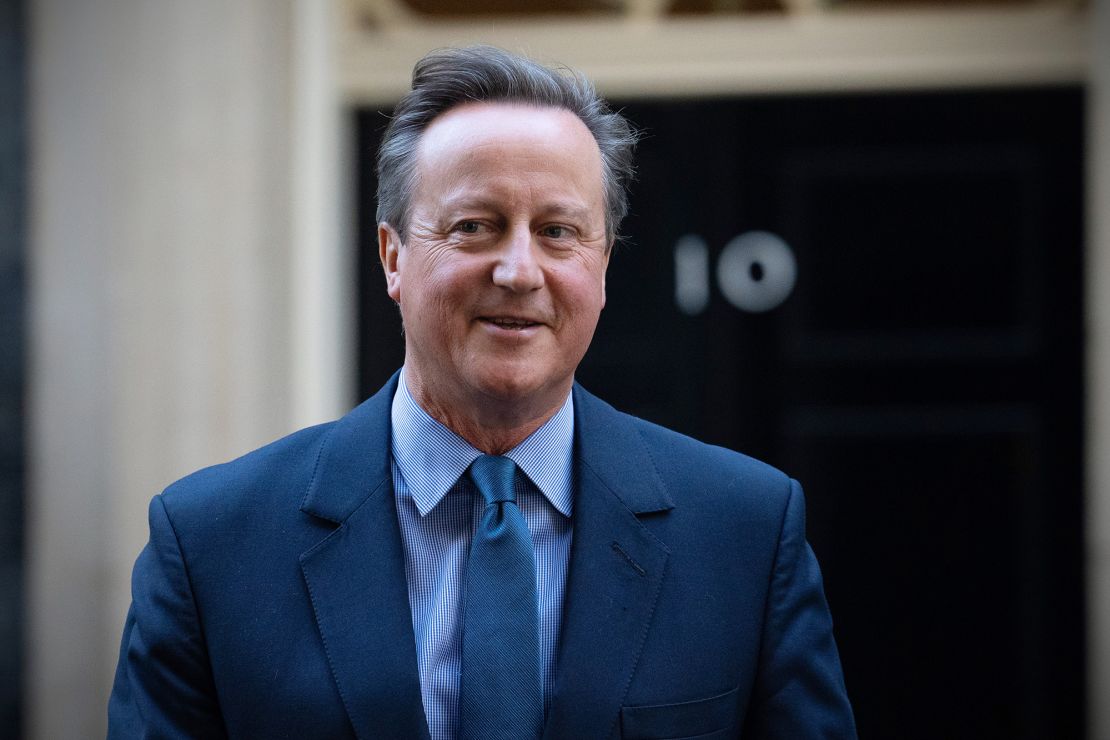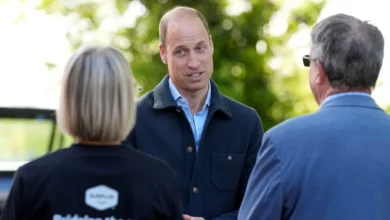
Britain’s beleaguered Prime Minister Rishi Sunak carried out a dramatic Cabinet reshuffle on Monday, firing his divisive home secretary and bringing back former premier David Cameron to the heart of government after a seven-year absence from politics.
The hardline Home Secretary Suella Braverman was fired early on Monday morning, after making inflammatory comments about the policing of pro-Palestinian protests in central London over the weekend. Her tenure was wrought with scandals and divisive remarks, which had long caused fractures in Sunak’s government.
Sunak then announced he was bringing Cameron back to frontline politics as foreign secretary, in a stunning move that has few parallels in recent British political history.
Cameron served as prime minister from 2010 to 2016, resigning after Britain voted to leave the European Union in a referendum that he had called.
His premiership set the course of 13 years of Conservative rule, but the self-inflicted chaos of the Brexit referendum and its aftermath threw his party into years of instability from which it is still struggling to emerge.
Downing Street confirmed that James Cleverly, formerly the foreign secretary, will take over from Braverman, a shift that made space for Cameron’s remarkable return to Cabinet.
Braverman had served as Sunak’s interior minister throughout his tenure in Downing Street, but her confrontational rhetoric towards migrants, protesters, the police and even the homeless had caused rifts in the government and sparked speculation that she was plotting a future leadership bid.
She most recently courted criticism by accusing London’s police force of applying “double standards” in the way they manage protests, in an op-ed in the Times of London newspaper condemning a pro-Palestinian march that Downing Street said had not been cleared by Sunak.
On Saturday, far-right counter-protesters clashed with police in central London after Braverman called the pro-Palestinian demonstration a “hate march,” stoking tensions around a rally taking place on Remembrance Sunday.
Braverman’s comments on policing and her severe criticism of Saturday’s pro-Palestinian rally were criticized by figures across the political spectrum.
“You have a chance of inflaming both sides when you make such divisive remarks,” Neil Basu, the former head of counter-terrorism policing in the UK, told the BBC on Monday morning. “Making comments that are potentially divisive is a very dangerous thing to do… no home secretary we’ve served under would have done the same thing.”
Her departure from government comes as Sunak’s party remains deeply unpopular among voters, with polls suggesting the Conservatives are drifting towards a potentially catastrophic electoral defeat next year.
Sunak has apparently gambled that bringing Cameron back into the fold would project a stability that has been missing from Westminster for some time. But it risks deepening a view among large swathes of the public that the party has run out of ideas.
Cameron resigned as an MP shortly after leaving Downing Street, meaning that King Charles was required to rapidly approve his ascension to the House of Lords on Monday in order for him to become a minister.
In recent decades, the move can only be compared to Alec Douglas-Home – prime minister for a year from 1963 – who returned as foreign secretary in 1970 under Edward Heath’s government.
The arrangement has led to questions over how Britain’s new foreign secretary will be held to account; it is virtually unheard of in modern politics for a very senior minister to sit in the Lords, and not in the Commons, where MPs operate.
“I know it’s not usual for a prime minister to come back in this way but I believe in public service,” Cameron told broadcasters in his first interview after taking the role.
Cameron makes stunning comeback
Cameron wrote on Monday that he “gladly accepted” Sunak’s offer to become foreign secretary, but acknowledged criticisms he has made of the Prime Minister — such as when Sunak scrapped a long-awaited and expensive high speed rail project that Cameron had championed.
“Though I may have disagreed with some individual decisions, it is clear to me that Rishi Sunak is a strong and capable Prime Minister, who is showing exemplary leadership at a difficult time,” Cameron said.
His return to Cabinet is a staggering twist in an influential political career that had seemingly and abruptly ended seven years ago.
Cameron returned the Conservative Party to government in 2010 in a coalition with the centrist Liberal Democrats, having repaired the Tories’ then-broken image as an out-of-touch and antiquated political group.

He melded liberal social policies — pushing his party to approve the legalization of same-sex marriage — with austere economics, drastically cutting back the budgets of Britain’s public services and reducing the size of the state.
But Cameron stepped down after unsuccessfully campaigning to remain in the EU.
His appointment as foreign secretary suggests that the Tories’ experiment with populism — which first flourished during the Brexit campaign and captured the heart of the party during the tenures of Boris Johnson and Liz Truss — has been ditched in the run-up to next year’s general election.
Barely a month ago Sunak addressed the Conservative Party membership at their annual conference, describing himself as the change candidate and directly attacking aspects of his own party’s past 13 years in office. He signaled that he was ready to lean into culture war politics on trans rights and climate change.
Now, two of his three most senior Cabinet posts are filled with moderate veterans of 21st century Conservatism — in Cameron and Jeremy Hunt, the Chancellor.
Cameron was ardently opposed to Brexit; despite calling the 2016 referendum to appease right-wingers in his party, he campaigned against the split from the EU and told The Times in 2019 that some people “will never forgive me” for holding the vote.
Unlike Braverman, neither Cleverly nor Cameron are likely to go off script and lash out at the police or protesters. It would be hard to imagine, for example, either man advocating for the UK to leave the European Convention on Human Rights so it can more easily send refugees to Rwanda –- a key Braverman policy that courts have been blocking for months.
But Braverman’s influence is unlikely to disappear. Sunak has made a powerful enemy of Braverman and handed ammunition to critics who will see today as confirmation of something they’d already suspected: that the Prime Minister is a centrist sellout who is more comfortable surrounded by other centrist Conservatives than pushing populism.
Braverman dismissed after string of controversies
Braverman has long been a controversial figure within the Conservative Party. She has attempted to excite the group’s right-wing grassroots with populist messaging, and become the face of Britain’s hardline stance against asylum-seekers and illegal immigrants, but her rhetoric and controversy-ridden tenure in government has appalled many moderate members of the party.
Days before her comments on Saturday’s protest deepened discord between her office and the police, she claimed in a post on the social media platform X that rough sleepers were “living on the streets as a lifestyle choice,” and advocated a policy to stop homeless people accessing tents.
Sunak had insisted as recently as Thursday that he had confidence in Braverman. But his spokesperson said Monday that there were “issues around language” that emerged over the course of their working relationship, as well as “differences of style.”
“It’s right that we can move forward now and focus on what matters to people,” his spokesperson said.
Sunak is understood to have spoken with Braverman over the phone on Monday morning after taking the decision to fire her.
But her dismissal sets up a potential power battle at the top of the ruling party, pitching Britain towards yet another spell of political infighting and instability.
While a leadership challenge against Sunak would be a dramatic risk for a party that has already cycled through five prime ministers in seven years, there is a growing murmur of discontent in its ranks at Sunak’s inability to reverse the Conservatives’ fortunes.
Alternatively, Braverman may be eyeing a run for leadership after the impending general election, expected late next year, should the Conservatives lose power to the buoyant opposition Labour Party.
But even in that scenario, Braverman will be expected to use the coming months to position herself as a radical alternative to Sunak – a pitch that could complicate the prime minister’s electoral campaign in the new year.
Monday marks the second time in just over a year that Braverman has been sacked as home secretary. She served in the post for six weeks during Liz Truss’s shambolic premiership last year, before resigning for breaching ministerial rules by using a private email address.
But she was back in the same position just days later; her resignation sparked Truss’s downfall, and her successor Sunak speedily reinstated her after seizing power.
Under Sunak, Braverman spearheaded a heavily publicised push to clamp down on small boat crossings made by asylum-seekers. The government’s flagship illegal migration bill, approved by MPs earlier this year, would essentially hand the government the right to deport anyone arriving illegally in the United Kingdom.
She is an equally furious culture warrior, borrowing rhetoric from the American right when lambasting “woke” culture, transgender rights and climate protesters.
Her frequent headline-snatching remarks have given ammunition to the government’s critics. Last week, after Sunak’s government unveiled its plan for the new session of Parliament, opposition leader Keir Starmer told Sunak in the House of Commons to “think very carefully about what she is committing your government to do.”
“Without a serious home secretary, there can be no serious government and he cannot be a serious prime minister,” Starmer said.
CNN’s Luke McGee, Catherine Nicholls and Niamh Kennedy contributed reporting




